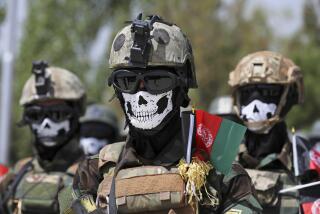Afghans’ Cruel Fate
- Share via
President Reagan and his top aides came away from Geneva with the impression that Soviet leader Mikhail S. Gorbachev just might be willing to make a deal on withdrawal of Soviet troops from Afghanistan. So far it is only an impression.
The Soviet Union invaded Afghanistan in late 1979 and imposed a puppet Marxist government that it hoped would be more effective, as well as more malleable, than the pro-Soviet government that it replaced. But the vast majority of the Afghan people are devout Muslims and fiercely anti-Soviet. Despite the presence of 115,000 Soviet troops, the cruel war of repression is still meeting heavy resistance from Afghan guerrillas who operate from bases in Pakistan with U.S. support.
The guerrillas lack the military strength to throw the Russians out. And Soviet actions inside the country hardly suggest any intention of leaving; thousands of Afghan children, for example, are being shipped off to Soviet schools for ideological conditioning.
Still, the war is a drain on Soviet resources, as well as a sore point in Moscow’s relations with the West and with the Muslim world. So it is conceivable that the Soviets might at some point be willing to pull out if a neutral Afghanistan could be guaranteed. In fact, indirect talks have been held between Pakistan and Afghanistan since June, 1982, under United Nations sponsorship.
The two sides seemingly have made progress. They apparently agree in principle that 3 million Afghan refugees would be allowed to return to their homes. They also agree tentatively on arrangements to ensure that, if peace were declared, Pakistan would not continue to help Afghan guerrillas and Kabul would stop encouraging unrest among Pathan tribesmen in Pakistan. The United States gave the negotiating process a helpful push this month by announcing its readiness to serve as a guarantor of an acceptable peace settlement; the Soviets have made a similar offer. The suspension of the talks last week, however, underscores the fact that no settlement can occur in the absence of an agreement on the fundamental issue of a Soviet military withdrawal, without which the guerrillas are not about to call off the war.
The United States and Pakistan are willing to settle for an independent Afghanistan aligned with neither East nor West, on the condition that the settlement also provides for withdrawal of Soviet troops, return of the refugees and genuine self-determination by the Afghan people. But the Soviets seemingly remain unwilling to consider withdrawal unless they can be assured that their hand-chosen government will remain in power. Since the hated Kabul regime could not survive without the presence of Soviet troops, no settlement is possible until the Russians ease their stand or the Afghan resistance fades.
Neither is likely to happen soon, and, unfortunately, time is not necessarily working against the Soviets. Meaningful Afghan resistance could not continue without support from Pakistan, the conduit for military aid from the United States and sympathetic Muslim countries. But opposition to Pakistan’s role in the war is growing among politicians in Karachi who fear the consequences for Pakistan of Soviet enmity.
Skepticism about the possibility of a Soviet withdrawal is appropriate, but American interest lies in keeping the U.N.-sponsored talks going on the off-chance that the pressures on Moscow for a settlement may be greater than they look.
More to Read
Sign up for Essential California
The most important California stories and recommendations in your inbox every morning.
You may occasionally receive promotional content from the Los Angeles Times.













